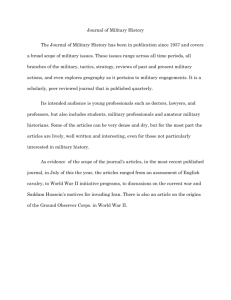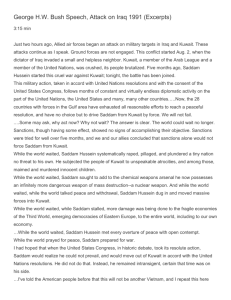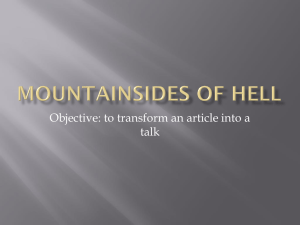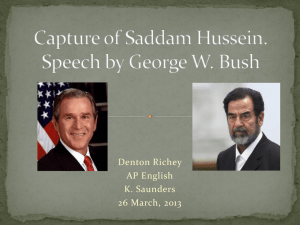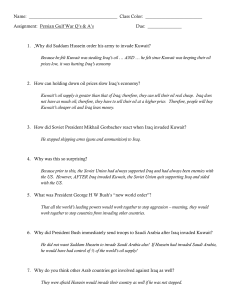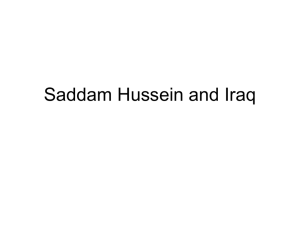The Gulf War: Eight Myths
advertisement
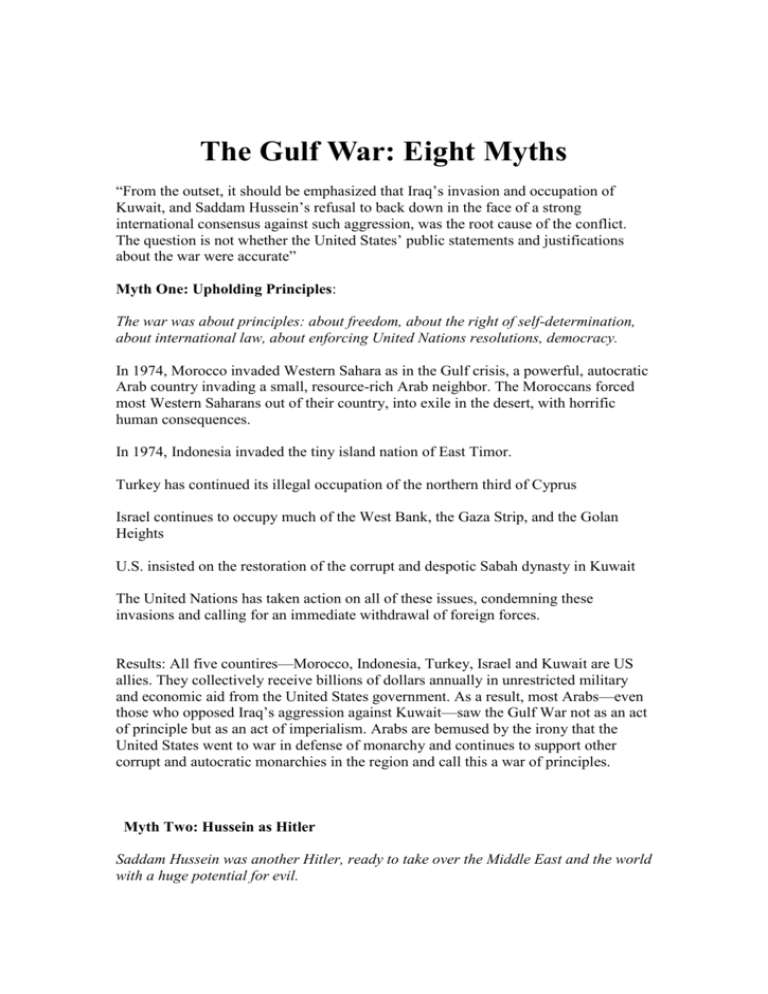
The Gulf War: Eight Myths “From the outset, it should be emphasized that Iraq’s invasion and occupation of Kuwait, and Saddam Hussein’s refusal to back down in the face of a strong international consensus against such aggression, was the root cause of the conflict. The question is not whether the United States’ public statements and justifications about the war were accurate” Myth One: Upholding Principles: The war was about principles: about freedom, about the right of self-determination, about international law, about enforcing United Nations resolutions, democracy. In 1974, Morocco invaded Western Sahara as in the Gulf crisis, a powerful, autocratic Arab country invading a small, resource-rich Arab neighbor. The Moroccans forced most Western Saharans out of their country, into exile in the desert, with horrific human consequences. In 1974, Indonesia invaded the tiny island nation of East Timor. Turkey has continued its illegal occupation of the northern third of Cyprus Israel continues to occupy much of the West Bank, the Gaza Strip, and the Golan Heights U.S. insisted on the restoration of the corrupt and despotic Sabah dynasty in Kuwait The United Nations has taken action on all of these issues, condemning these invasions and calling for an immediate withdrawal of foreign forces. Results: All five countires—Morocco, Indonesia, Turkey, Israel and Kuwait are US allies. They collectively receive billions of dollars annually in unrestricted military and economic aid from the United States government. As a result, most Arabs—even those who opposed Iraq’s aggression against Kuwait—saw the Gulf War not as an act of principle but as an act of imperialism. Arabs are bemused by the irony that the United States went to war in defense of monarchy and continues to support other corrupt and autocratic monarchies in the region and call this a war of principles. Myth Two: Hussein as Hitler Saddam Hussein was another Hitler, ready to take over the Middle East and the world with a huge potential for evil. Washington’s knowledge of his human rights abuses and his war of aggression against Iran, the violation of international prohibitions against the use of chemical weapons were overlooked as long as he was politically useful. When his usefulness lapsed, Washington portrayed Hussein as some kind of monster. Washington was never able to produce any evidence to support its contention that Iraq was preparing an imminent invasion of Saudi Arabia. Though such an action by the Iraqis cannot be ruled out, it appears extremely unlikely - - No territorial claims against Saudi Arabia, Iraqi troops dug in to fortified defensive positions immediately upon entering Kuwait, Iraq’s troops did not move into Saudi Arabia, despite the lack of sufficient Western forces to produce a credible deterrent. Satellite footage of the area from that critical period soon after the Iraqis seized Kuwait, shows no evidence of Iraqi troops massing on the border with Saudi Arabia. Iraq only increased its number of troops in Kuwait only after allied forces arrived. Iraq did not have industrial capacity, the self-sustaining economy, the domestic arms industry, the population base, the coherent ideology or political mobilization, the powerful allies, or any of the necessary components for large-scale military conquest The cover of the New Republic magazine used a photograph of Saddam Hussein airbrushed in such a way that his long moustache was significantly shortened to make him look more like Adolf Hitler. Just like the photograph has altered so was the arquement that Saddam was another Hitler Myth Three: Iraq as a Nuclear Threat Saddam Hussein was on the verge of producing nuclear weapons. Reports indicated that Iraqis would have an offensive nuclear capability within just months and needed to be stopped. This rhetoric surfaced a few months before the start of the US military campaign , when public opinion polls first indicated that this was the one reason that most Americans felt could justify a military attack against Iraq. Saddam Hussein had for some time been calling for a nuclear-free zone in all of the Middle East Unlike Israel and Pakistan, Iraq had signed the Nuclear Non-Proliferation Treaty and had opened its nuclear sites to international inspection teams. To assert that Iraq would suddenly start threatening its neighbors with nuclear weapons was simply a scare tactic. To believe otherwise would be an admission that nuclear deterrence—the cornerstone of U.S. foreign policy for decades—is a lie. Myth Four: Ending Saddam Hussein’s Power The war was fought to get rid of a dictator—Saddam Hussein President Bush urged the people of Iraq to rise up against their dictator, yet the U.S. did nothing to support the postwar rebellion and stood by while thousands of Iraqi Kurds, Shiites, and others were slaughtered. In the cease-fire agreement at the end of the war, the U.S. made a conscious decision to exclude helicopter gunships from the ban on Iraqi military air traffic, even though these were the very weapons that proved so decisive in crushing the rebellions. Fifteen years earlier, after goading the Kurds into an armed uprising with the promise of military support, the U.S., as part of an agreement with the Baghdad government for a territorial compromise (Algiers Agreement on Shatt al Arab) favorable to Iran, abandoned the Kurds precipitously; thousands were slaughtered. Washington has never opposed Saddam when his repression is exclusively internal or his aggression is directed toward U.S. adversaries. Myth Five: The Only Option Military force was the only way to deal with Saddam Hussein’s invasion. Days immediately following Iraq’s invasion of Kuwait, Arab leaders were very close to convincing Iraq to withdraw. Unilateral demands are not negotiations. American specialists on the negotiation process felt that the United States wanted a war, given that Washington gave the Iraqis no opportunity to save face. One needs to declare some kind of victory, if only a 2% victory. There were a number of ways the United States could have negotiated an Iraqi withdrawal from Kuwait and met other legitimate security concerns short of declaring war. Minor boundary adjustments or an internationally supervised referendum on the future of the Kuwaiti monarchy could have been proposed and pursued, but were not. In the middle of the war, in late February, the Iraqis agreed to withdraw from Kuwait prior to the launching of the ground war, accepting the Soviet peace proposal in full. UN sanctions, which were working. The CIA estimated that UN sanctions blocked 90% of Iraqi imports and 97% of Iraqi exports; no country can survive very long under those conditions. Such a rate of compliance vastly exceeds that of the postwar sanctions regime. The CIA predicted that Iraq would be forced out of Kuwait by sanctions alone within six months. Myth Six: Protects U.S. Interests The war was vital to United States economic and political interests See point 2 Only a small percentage of oil consumed by Americans comes from the Middle East. The Europeans and Japanese are far more dependent on Persian Gulf exports, but they were far less eager to go to war over Kuwait. Perhaps it is no accident that the first president to get the U.S. into a major Middle Eastern war was also a former oil company executive. Despite the Gulf War, the postwar sanctions, the ongoing U.S. military presence in the Middle East, and the support of Israel and autocratic Arab regimes, individual Americans and U.S. interests as a whole are more threatened in the Middle East than ever before. This raises the ironic dilemma: in the quest for greater American security in the Middle East, has the United States not made itself more insecure? Myth Seven: The Multinational Force US was part of a multinational force. An mpressive unity in the world community in terms of opposition to Iraq’s aggression against Kuwait. The prewar sanctions were almost universally respected. United States received lukewarm support from the UN Security Council essentially through bribery. - China: the U.S. dropped trade sanctions and approved new loans. - Soviet support: U.S. ensured that the repression in the Baltic republics and Cacucus region were not discussed at the Paris Peace Conference. - Colombia and Zairewere increased aid and extensions of loans. However, the military forces were overwhelmingly American, Myth Eight: Ethical Considerations Not Essential Ethical considerations should not play a part in evaluating the war. Americans were told repeatedly, “we did this to Saddam, we did that to Saddam” Emphasis on collotaral damage and “smart bombs”. It is the people of Iraq who died in great numbers, with most estimates in the range of 100,000 to 175,000. It should be noted that even the so-called “smart bombs” had at most a 60% accuracy rate. Americans did not see any footage of the 40% that missed their targets, sometimes by miles. Americans were told that U.S. pilots made a good faith effort to avoid women and children. But does that mean that adult men are expendable? Most of Saddam Hussein’s forces were conscripts; many were even his opponents. In fact, Saddam deliberately placed on the front lines a disproportionate number of Kurds, Assyrian Christians, Shiites, and other groups traditionally opposed to his leadership. The result is that more opponents of the Iraqi government were slaughtered in six weeks of U.S. attacks than during the previous twenty years of Saddam Hussein’s repression. United Nations mandate to use force only referred to the liberation of Kuwait. Yet the United States bombed virtually all of Iraq, including targets unrelated to the occupation. Conclusions The fact that so many Arabs supported Saddam is not due to the racist notion that there is something inherent in Islamic culture that predisposes Arabs to support autocrats. Rather it is a very deep-seated feeling of a people who have repeatedly been subjected to foreign domination and have found a symbol of resistance in Saddam Hussein. Thus, there was real concern, both in the Middle East and beyond, that the United States was using Iraq’s invasion of Kuwait as an excuse to exert a long-desired military, political, and economic hegemony in the region.


